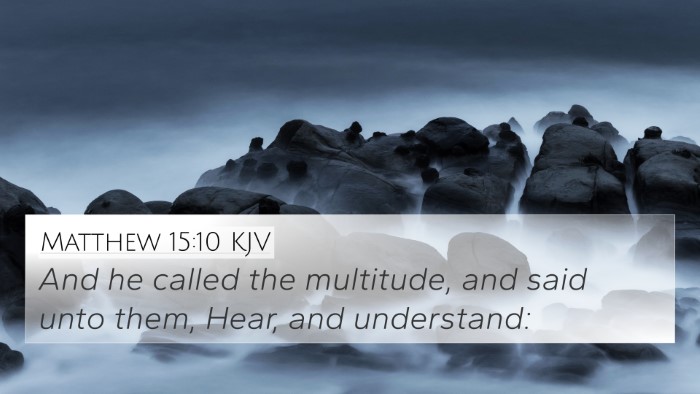Understanding Matthew 23:1
Verse Reference: Matthew 23:1
Verse Text: "Then Jesus spoke to the crowds and to His disciples." (Matthew 23:1, NASB)
Summary of Insights from Commentaries
This verse opens a significant chapter where Jesus addresses both His disciples and the large crowds that surrounded Him, highlighting His role as a teacher and authority. Notably, Matthew Henry's commentary emphasizes the importance of Jesus’ teaching by indicating that He speaks with divine authority rather than earthly credentials. Jesus is establishing whom He speaks to, and this serves as an introduction to the critical lessons that follow regarding hypocrisy among religious leaders.
Albert Barnes further comments on this verse, noting the context of His teaching and its implications for His audience. Barnes suggests that the "crowds" refer to the general populace while "disciples" points specifically to those committed to following Him. This distinction shows how Jesus’ teachings apply to varied groups and emphasizes the importance of following His guidance over that of the Pharisees.
Adam Clarke explores the historical and cultural significance of this moment, emphasizing how Jesus is appealing to both learned and unlearned minds, which demonstrates an inclusive approach to spiritual instruction. This aligns with His mission of making the Kingdom of God accessible to all.
Thematic Connections
Matthew 23:1 serves as a theme initiator for several key topics including:
- Authority of Christ: Demonstrates His teaching authority as the Son of God.
- Hypocrisy of Religious Leaders: Sets the stage for Jesus’ criticism of the Pharisees and their practices.
- Inclusiveness in Teachings: Addresses both common people and His closest followers, showing the breadth of His message.
Bible Cross-References
This verse relates to several other scriptures that highlight similar themes of authority, teaching, and the warning against hypocrisy:
- Matthew 5:1-2: Jesus teaches His disciples and the crowd from the mount.
- Matthew 7:29: "For He was teaching them as one having authority, and not as their scribes."
- Matthew 15:14: Jesus speaks of the blind leading the blind, highlighting the dangers of following false teachers.
- Luke 12:1: Jesus warns His disciples about the leaven of the Pharisees, which is hypocrisy.
- Mark 12:38-40: Jesus openly criticizes teachers of the Law for their hypocrisy and exploitation.
- John 7:46: Even the officers sent to apprehend Jesus testified that "Never did a man speak the way this man speaks."
- Acts 5:29: "We must obey God rather than men," emphasizing the need for divine authority in teaching.
Comparative Bible Verse Analysis
When linking Bible verses, Matthew 23:1 opens the door to comparative analysis of Jesus’ teachings with those of the Old Testament prophets:
- Isaiah 1:10: “Hear the word of the Lord, you rulers of Sodom; give ear to the teaching of our God, you people of Gomorrah!” — Similar call to attention and teaching.
- Jeremiah 23:1-2: Woe to the shepherds who destroy and scatter the sheep of My pasture! — Jesus parallels this concept in His critiques.
How to Use Bible Cross-References
Understanding connections between Bible verses can deepen comprehension of the themes and messages conveyed throughout scripture. Follow these steps:
- Identify Themes: Focus on the central message of the verse.
- Look for Cross-References: Use tools like a Bible concordance or cross-reference guide to find related scriptures.
- Compare and Contrast: Analyze how the messages in different verses relate to each other.
- Contextual Reading: Always read verses in context to understand their full meaning and implications.
Conclusion
Matthew 23:1 serves as an essential prelude to the teachings and admonishments Jesus provides throughout Matthew 23. It underscores His role as a genuine teacher, his authority, and his admonition against the hypocrisy of the religious leaders of His time. Through careful cross-referencing and thematic exploration of related verses, readers can gain a clearer understanding of the biblical message concerning authority, truth, and spiritual leadership.








